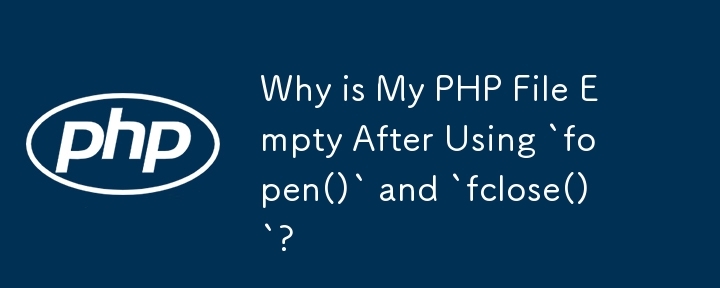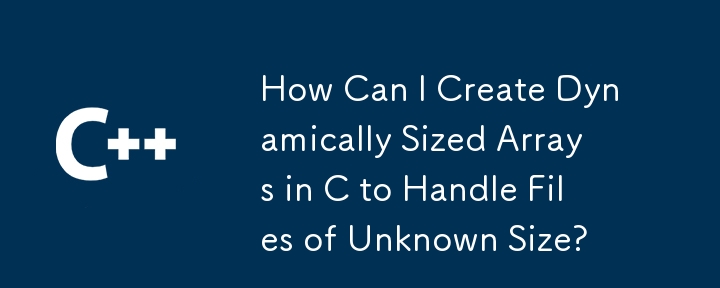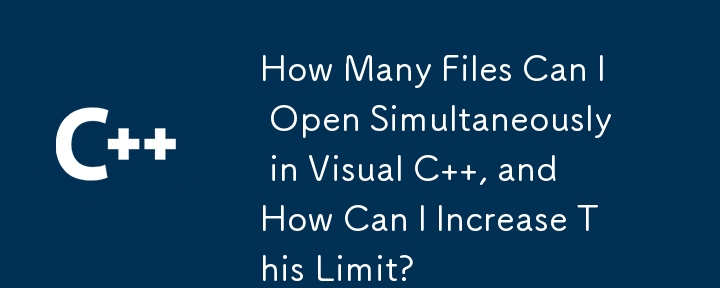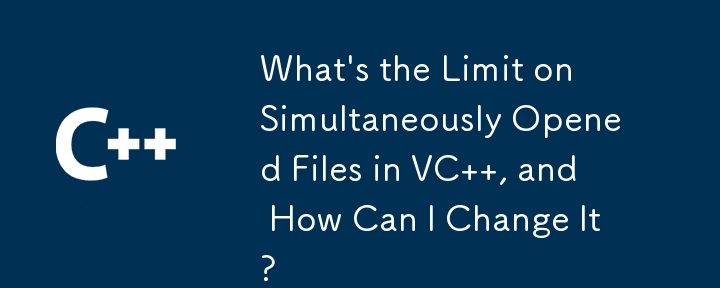Found a total of 10000 related content

C language file handling common doubts lying
Article Introduction:Common doubts about handling C language file literacy 1. Trouble using fopen() function FILE*ptr=fopen("file.txt","r");if(ptr==NULL){//File opening failure processing} Common difficulties: The failure of fopen() function to open a file includes the file does not exist, insufficient permissions or is restricted by system resources. In the if statement, determine whether it is successfully opened based on the returned NULL value. 2. Similarities and differences between getc() and fgetc() functions intch=getc(ptr); chearch=fgetc(ptr); Similarities and differences: getc() function returns
2025-04-04
comment 0
508


Programmatically Creating WordPress Posts from CSV Data
Article Introduction:Key Takeaways
Utilize PHP functions like glob(), fopen(), and fgetcsv() to extract data from CSV files and prepare it for WordPress post creation.
Implement custom post types and fields using plugins like Custom Post Type UI and Advanced Custom
2025-02-18
comment 0
723

C language file operation: How to write files?
Article Introduction:Steps to write files in C language: Use the fopen() function to open the file and specify the writing mode ("w" or "a"); use the fprintf() function to write data to the file; use the fclose() function to close the file.
2025-04-04
comment 0
513

In-depth analysis of C language file operation problems
Article Introduction:In-depth analysis of C language file operation problems Preface file operation is an important function in C language programming. However, it can also be a challenging area, especially when dealing with complex file structures. This article will deeply analyze common problems in C language file operation and provide practical cases to clarify solutions. When opening and closing a file, there are two main modes: r (read-only) and w (write-only). To open a file, you can use the fopen() function: FILE*fp=fopen("file.txt","r"); After opening the file, it must be closed after use to free the resource: fclose(fp); Reading and writing data can make
2025-04-04
comment 0
1074

C language file operation: How to handle text files?
Article Introduction:In C, file operations allow us to store and retrieve data, including text files. To process text files, you must first use fopen() to open the file, then use fgets() to read it line by line, write it with fputs(), and finally use fclose() to close the file.
2025-04-04
comment 0
683

PHP creates files and writes them into contents. Precautions and tips for writing contents of PHP files
Article Introduction:Efficiently creating files and writing content in PHP is mainly achieved through fopen, fwrite and fclose functions. 1. Use fopen to open the file, fwrite to write the content, and fclose to close the file. 2. Pay attention to file permissions and security, and use chmod to adjust permissions. 3. Perform error handling, use the try-catch block or check the return value of the function. 4. Use flock to implement file locking in a multi-user environment. 5. For large files, use file_put_contents to optimize performance. 6. Choose the appropriate writing mode according to your needs, such as w, a, and x. 7. Control the buffer size and use stream_set_write_buffer to
2025-05-28
comment 0
339

C language file operation: How to read files?
Article Introduction:C language file operation: Read file introduction File processing is a crucial part of C language programming, which allows programs to interact with external storage devices such as disks and flash drives. This article will explore how to read files in C language. Steps to read a file to open the file: use the fopen function to open the file. This function requires two parameters: file name and open mode. Check whether the file is open: Check whether the pointer returned by the fopen function is NULL. If NULL, the file cannot be opened. Read file: Use the fread function to read data from the file to the buffer. This function requires four parameters: buffer address, buffer element size, number of elements to be read, and file pointer. Close the file: Use f
2025-04-04
comment 0
859

What does c language file mean
Article Introduction:In C language, File is an abstract data type used to abstractly represent files. It can be used in the following steps: Open the file using the fopen() function, which returns a FILE pointer for accessing the file. Use the fread() and fwrite() functions to read or write data from files respectively. Use the fclose() function to close the file and release the resources associated with the file.
2025-04-03
comment 0
522

C language comprehensive understanding of file operations
Article Introduction:C language provides file operation functions, including opening, closing, reading, writing and moving file pointers. These functions support a variety of operations, such as reading data, writing data, and moving it in a file. Use fopen() and fclose() to open and close files, fread() and fwrite() can be used for data reading and writing, and fseek() allows users to move in files. These functions are widely used in practical applications, such as file copying.
2025-04-04
comment 0
430

Quick Tip: How To Read a Local File with PHP
Article Introduction:PHP provides three native functions for local file operations: file(), file_get_contents() and fopen(). Although complete libraries are built around these functions, they are still the preferred method of quickly manipulating PHP files.
We will first understand the functions of these functions and then look at their working examples.
file() and file_get_contents()
File() and file_get_contents() work very similarly. They all read the entire file. However, file() reads the file into the array, while file_get_contents() reads the file
2025-02-08
comment 0
762

Troubleshooting tips for processing files in C language
Article Introduction:Troubleshooting Tips for C language processing files When processing files in C language, you may encounter various problems. The following are common problems and corresponding solutions: Problem 1: Cannot open the file code: FILE*fp=fopen("myfile.txt","r");if(fp==NULL){//File opening failed} Reason: File path error File does not exist without file read permission Solution: Check the file path to ensure that the file has check file permission problem 2: File reading failed code: charbuffer[100];size_tread_bytes=fread(buffer,1,siz
2025-04-04
comment 0
1019

How does PHP handle file system operations, and what are the security considerations?
Article Introduction:PHP handles file system operations through built-in functions, but needs to pay attention to security risks. Common functions include fopen(), file_get_contents(), unlink(), etc., which are used to read, write, delete and check files; user input must be verified during operation to prevent path traversal attacks; script access to directories should be restricted through open_basedir; reasonable permissions should be set to avoid sensitive files being read and written; verification of types and renaming when uploading files; performance is recommended to use buffer reading and regular cleaning of temporary files. Following best practices can improve safety and efficiency.
2025-06-19
comment 0
656



















